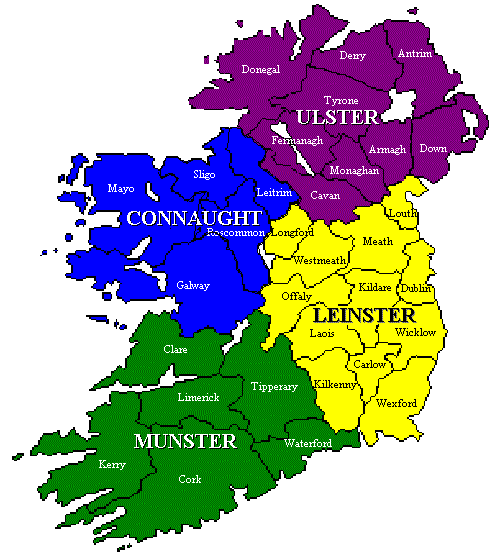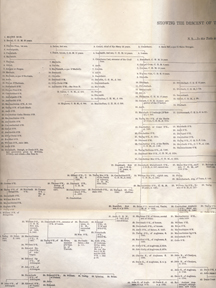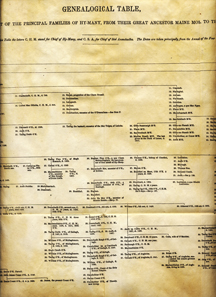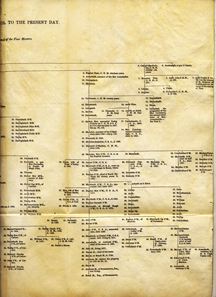|
Comment by Rick O'Kelley 01/2014
 For many years I have been aware
of and have read Dr. John O'Dovovan's 1843 book about the
O'Kelly
regional kings or
Chiefs of Ui Maine (Hy-Many) Ireland.
Thomas Dean O'Kelley of
my family born
on 4 September 1856 after graduating college in 1883, he
traveled to Europe with his college professor and
Ireland was one of the places they visited. He
came back with the Hy-Many Coat of Arms and a story
that all O'Kelleys descend from the HY-Many which at
that time they might have believed that true after
all some of the Hy-Many O'Kellys did come to America
in the 1600s. Thomas Dean O'Kelley's son,
Fredrick Henry O'Kelley, was an artist he
painted some copies, he made numerous copies and
gave them as gifts over the years which have been
handed down to his living descendents today and one
of these exact copies right down the makers mark was
used by Alethea Jane Macon inside the cover of her
1969 book. Even the Funk and Wagnalls
Encyclopedia in the book case in my parents home
made the claim that all O'Kellys came from Teague
O'Kelly who died at the Battle of Contarf so the
belief that we were Hy-Many or Ui Mhaine was deeply
engrained in my family and even some of the Irish
Hy-Many believed it true also. For many years I have been aware
of and have read Dr. John O'Dovovan's 1843 book about the
O'Kelly
regional kings or
Chiefs of Ui Maine (Hy-Many) Ireland.
Thomas Dean O'Kelley of
my family born
on 4 September 1856 after graduating college in 1883, he
traveled to Europe with his college professor and
Ireland was one of the places they visited. He
came back with the Hy-Many Coat of Arms and a story
that all O'Kelleys descend from the HY-Many which at
that time they might have believed that true after
all some of the Hy-Many O'Kellys did come to America
in the 1600s. Thomas Dean O'Kelley's son,
Fredrick Henry O'Kelley, was an artist he
painted some copies, he made numerous copies and
gave them as gifts over the years which have been
handed down to his living descendents today and one
of these exact copies right down the makers mark was
used by Alethea Jane Macon inside the cover of her
1969 book. Even the Funk and Wagnalls
Encyclopedia in the book case in my parents home
made the claim that all O'Kellys came from Teague
O'Kelly who died at the Battle of Contarf so the
belief that we were Hy-Many or Ui Mhaine was deeply
engrained in my family and even some of the Irish
Hy-Many believed it true also.
Author
W E MacClenny in his 1910 book about
Rev
James makes a claim that he descended from the O'Kellys of Hy-Many, and
Alethea Jane Macon in her 1969 book
echoes this claim most all my family believed we descended from these
O'Kelleys and that belief goes back more than 100 years so imagine my
surprise when I completed a Y DNA test in August of 2010 and learned that while I am
related, the grandfather that my O'Kelley family shares a
grandfather with the O'Kelly
of Hy-Many that shared grandfather lived before surnames came into use
so we were not of the O'Kelly of Hy-Many.
While I was disappointed in 2010 to learn that what
everyone had been telling me about being of the O'Kelly of Hy-Many
wasn't true, today in 2014 I am very pleased at my Y-DNA result
discoveries because of the advancements and new
discoveries in DNA testing of ancient remains, in 2024 my Y-DNA results
puts my oldest Irish male ancestor in Co Fermanagh about 4200 years ago
which is only 300 years after the grandfather I share with Hy-Many lived
and my Co Fermanagh ancestor's mtDNA connects me to a female ancestor
found buried in the Poulnabrone dolmen one of the oldest and most
visited sites in Ireland. I have
matches to several very ancient remains
putting my Irish Ancestors in Ireland 5442 years ago .
The ancestry of Hy-Many is well
documented so I used it with my DNA research to discover my true Irish
Ancestors. You can follow my 14 year DNA
journey here.
Here are some additional pages to aid the
understanding.
Chart from the back of the book broken into three
scans or full image
  

Perhaps one of the most interesting facts found in
this book is the explanation as to how some of the Irish Gaelic Gentry O'Kelleys came to be
protestant. While I haven't yet found the document, it seems
certain that the O'Kelleys of Tara followed the same path to becoming
Protestant. Beginning on page 18 and ending on page 20 we have:
In the reign of Elizabeth it consisted only of five
baronies, as appears from a curious document to be found among the "
Inrolments tempore Elizabeths," in the Auditor General's Office, Dublin,
dated 6th August, 1585. From this Document the Editor is tempted to
present the reader with the following extract, which throws a curious
light on the state of Hy-Many in the reign of Queen Elizabeth:
" Agreement
between the Irish chieftains and inhabitants of Imany, called the
O'Kellie's country, on both sides of the river of Suck, in Connaught,
and the Queen's Majesty, viz.
Hugh O'Kelly of Lisecalhone, otherwise
called O'kelly,
Teige Mac William O'Kelly, of Mullaghmore, and Connor
Oge O'Kelly, of Killianee, competitors for the name of Tanestshippe of
O'kelly ;
Connor ne Garroghe O'Kelly, of Gallaghef, and
Shane ne Move O'Kelly, of
the Criaghe, Generosus ; William O'Mannine, of Mynlogheb, otherwise
called O'mannine ; Moriartagh O'Concannon, of Kiltullagh, otherwise
called O'conCannon ; Shane O'Naghten, of Moynure1, otherwise called
O'naghten ; Edmond Mac Kcoghe, of Owenaghk, otherwise called Mac Keoghe
; Donogh O'Murry, of Ballymurry1, otherwise called O'murry ; Covaghe
O'Fallone, of the Milltowne", otherwise called O'Fallone ; and Connor
Mac Geraghte, otherwise called Mac Gerraghte".
" The territory of Imany, called O'Kelly's country, is divided into five
principal barronyes, that is to wytte, Athlone, Killconnell, Teaquine,
Killyane, and Maycarnane, all which contain 665 1/2 quarters of land, each
at 120 acres.
" It is agreed by all the forenamed parties that the captainshippe and
tanistshippe of the said country, heretofore used by the said O'Kellies,
and all ellections and Irish customary division of lands shall be
utterly abolished and extinct for ever: that
Hugh, otherwise called O'kelly, shall possess these four quarters of land, viz. Lisennoke,
Ferranbreaghe, Lysdallen, and Moydowe, now in his possession, and which
arc situated in Eraght-O'Murry and Mac Edmond's country, in the barony
of Athlone, with a chief rent out of various other lands within the said
country, which amount in the whole to £56 19.S. 6d. during his natural
life, and after his death the said lands to be freed and discharged of
the aforesaid rents.
" That Teige Mac William O'Kelly shall have and possess the quarters of
Mullaghmore, Corncgallaghe, Carrownesire, and Carrowncboe. And Connor
Oge O'Kelly shall have four quarters in and about the town of Killiane,
but upon this special condition, which they bind themselves to, that
they and their heirs shall henceforth behave themselves like good
subjects ; shall put no ymposition or chardge upon the inhabyters of the
lands, and shall bring uppc their children after the English fashions,
and in the use of the Englishe tounge."
|




